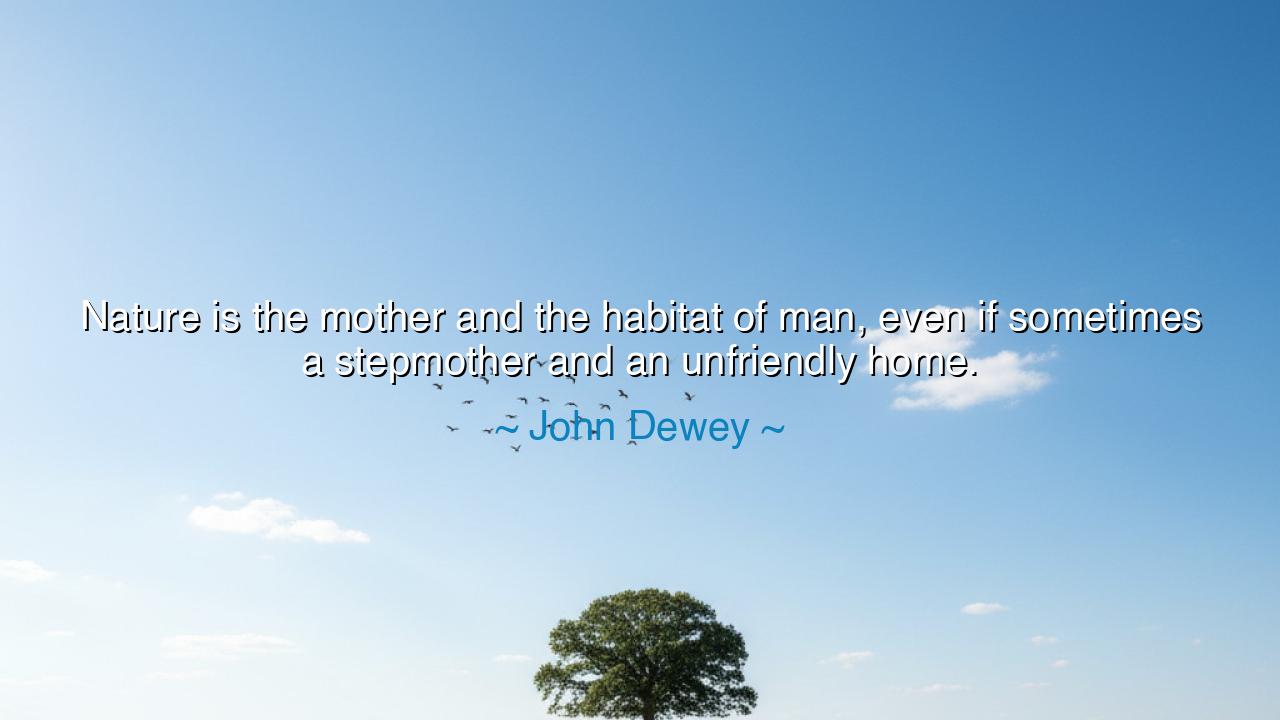
Nature is the mother and the habitat of man, even if sometimes a
Nature is the mother and the habitat of man, even if sometimes a stepmother and an unfriendly home.






“Nature is the mother and the habitat of man, even if sometimes a stepmother and an unfriendly home.” Thus spoke John Dewey, philosopher of learning and life, whose words remind us of a truth as old as humanity itself — that Nature is both the cradle that nourishes us and the force that tests us. In this quote, he captures the paradox of our existence: we are children of the earth, born from her soil, fed by her bounty, yet constantly humbled by her power. She is our mother, yet at times, she feels like a stepmother, cold and indifferent to our cries. But even in her harshness, she remains our teacher, shaping our spirit through challenge and change.
The origin of this quote lies in Dewey’s philosophy of naturalism — his belief that man is not apart from nature but a part of it, bound by the same laws that govern the stars and the sea. Living in an age of rapid industrial growth, Dewey sought to remind humanity of its roots — that beneath our machines, our cities, and our intellect, we are still creatures of the earth. His words are both reverent and realistic: Nature gives life, yet she also takes it away; she shelters us, but she demands our respect. To live wisely, Dewey implies, we must accept both her tenderness and her fury, for both are essential to the human story.
To call Nature “mother” is to honor her as the source of all being. Every breath we take, every morsel we eat, every dawn that greets us is her gift. Like a nurturing mother, she sustains without asking for praise. Yet Dewey, in his deep wisdom, does not cloak her in sentimentality. For every spring blossom, there is a winter storm; for every gentle breeze, there is a hurricane that can sweep away all we’ve built. In calling her also a stepmother, he acknowledges that Nature is not bound by human morality or emotion. She is beyond our notions of kindness or cruelty. Her lessons are sometimes harsh, but always just.
Consider the story of the eruption of Mount Vesuvius in ancient times, when the mighty Roman city of Pompeii was buried beneath ash and fire. In a single day, a thriving civilization was silenced, its art, laughter, and ambition swallowed by the mountain it had worshipped. Yet from that tragedy, centuries later, archaeologists uncovered a perfectly preserved record of ancient life — frescoes, streets, and stories that might otherwise have vanished. In destruction, Nature also preserved. So it is with us all: she humbles us, but through her trials, we remember who we are and what truly endures.
Dewey’s words also reflect the modern struggle — man’s growing distance from the natural world. We pave over rivers, pierce mountains, and seek to dominate what once nurtured us. But the more we separate ourselves from Nature, the more restless we become. For when we forget our mother, we lose our home. Even her wrath — the floods, the fires, the storms — is a reminder that balance must be restored. The unfriendly home is not punishment, but correction; it is Nature’s way of reminding us that harmony cannot be forced, it must be honored.
Yet even when she turns against us, there is still wisdom in her ways. The ancients revered this duality: they offered sacrifices not only for her blessings but for her mercy. They understood that to live is to dwell between gratitude and awe. Today, we are called to rediscover that reverence — to rebuild our relationship with the earth not as conquerors, but as caretakers. For every act of destruction we commit against Nature is an act of self-destruction. To care for her is to care for our own future.
So, my listener, learn from this: honor Nature as both mother and stepmother. Love her when she gives, and learn from her when she takes away. When the winds rage and the storms break, do not curse her, but seek the lesson hidden within her power. Return to her — in the quiet of the forest, the rhythm of the sea, the soil beneath your feet — and remember that you are not apart from her, but a thread in her vast tapestry. Live simply, walk gently, and protect what she has given. For though she may sometimes seem an unfriendly home, she remains the only home we shall ever know — and the only mother who will never truly abandon her children.






AAdministratorAdministrator
Welcome, honored guests. Please leave a comment, we will respond soon